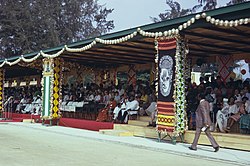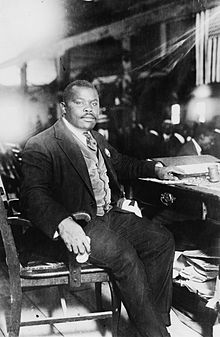Portal:Pan-Africanism
IntroductionWelcome to the Pan-Africanism portal!
Bienvenue sur le portail panafricanisme!     Pan-Africanism is a worldwide movement that aims to encourage and strengthen bonds of solidarity between all indigenous peoples and diasporas of African ancestry. Based on a common goal dating back to the Atlantic slave trade, the movement extends beyond continental Africans with a substantial support base among the African diaspora in the Americas and Europe. Pan-Africanism can be said to have its origins in the struggles of the African people against enslavement and colonization and this struggle may be traced back to the first resistance on slave ships—rebellions and suicides—through the constant plantation and colonial uprisings and the "Back to Africa" movements of the 19th century. Based on the belief that unity is vital to economic, social, and political progress, it aims to "unify and uplift" people of African ancestry. (Full article...) Selected articleNégritude is a framework of critique and literary theory, developed mainly by francophone intellectuals, writers, and politicians of the African diaspora during the 1930s. Its initiators included Martinican poet Aimé Césaire, Léopold Sédar Senghor (the first President of Senegal), and Léon Damas of French Guiana. Négritude intellectuals disavowed colonialism, and argued for the importance of a Pan-African racial identity among people of African descent worldwide. The intellectuals employed Marxist political philosophy, in the black radical tradition. The writers generally used a realist literary style, and some say they were also influenced somewhat by the Surrealist stylistics. In 1932, the manifesto "Murderous Humanitarianism" was signed by prominent Surrealists, including the Martinicans Pierre Yoyotte and J. M. Monnerot. Selected biography
Marcus Mosiah Garvey Jr. ONH (17 August 1887 – 10 June 1940) was a Jamaican-born political leader, publisher, journalist, entrepreneur, and orator. He was President-General of the Universal Negro Improvement Association and African Communities League (UNIA-ACL). He also was President and one of the directors of the Black Star Line, a shipping and passenger line incorporated in Delaware. The Black Star Line went bankrupt and Garvey was imprisoned for mail fraud in the selling of its stock. His movement then rapidly collapsed. Prior to the 20th century, leaders such as Prince Hall, Martin Delany, Edward Wilmot Blyden, and Henry Highland Garnet advocated the involvement of the African diaspora in African affairs. Garvey was unique in advancing a philosophy to inspire a global mass movement and economic empowerment focusing on Africa known as Garveyism. Garveyism would eventually inspire others, ranging from the Nation of Islam to the Rastafari movement (which proclaim Garvey as a prophet) and the Black Power Movement of the 1960s. Selected history  The history of Africa begins with the emergence of hominids, archaic humans and – at least 200,000 years ago – anatomically modern humans (Homo sapiens), in East Africa, and continues unbroken into the present as a patchwork of diverse and politically developing nation states. The earliest known recorded history arose in the Kingdom of Kush, and later in Ancient Egypt, the Sahel, the Maghreb and the Horn of Africa. Following the desertification of the Sahara, North African history became entwined with the Middle East and Southern Europe while the Bantu expansion swept from modern day Cameroon (West Africa) across much of the sub-Saharan continent in waves between around 1000 BC and 0 AD, creating a linguistic commonality across much of the central and Southern continent. During the Middle Ages, Islam spread west from Arabia to Egypt, crossing the Maghreb and the Sahel. Some notable pre-colonial states and societies in Africa include the Ajuran Empire, D'mt, Adal Sultanate, Warsangali Sultanate, Kingdom of Nri, Nok culture, Mali Empire, Songhai Empire, Benin Empire, Oyo Empire, Ashanti Empire, Ghana Empire, Mossi Kingdoms, Mutapa Empire, Kingdom of Mapungubwe, Kingdom of Sine, Kingdom of Sennar, Kingdom of Saloum, Kingdom of Baol, Kingdom of Cayor, Kingdom of Zimbabwe, Kingdom of Kongo, Empire of Kaabu, Kingdom of Ile Ife, Ancient Carthage, Numidia, Mauretania, and the Aksumite Empire. At its peak, prior to European colonialism, it is estimated that Africa had up to 10,000 different states and autonomous groups with distinct languages and customs. From the mid-7th century, the Arab slave trade saw Muslim Arabs enslave Africans. Following an armistice between the Rashidun Caliphate and the Kingdom of Makuria after the Second Battle of Dongola in 652 AD, they were transported, along with Asians and Europeans, across the Red Sea, Indian Ocean, and Sahara Desert. Selected cultureAfrican-American culture, also known as Black American culture, refers to the contributions of African Americans to the culture of the United States, either as part of or distinct from mainstream American culture. The distinct identity of African-American culture is rooted in the historical experience of the African-American people, including the Middle Passage. The culture is both distinct and enormously influential on American and global worldwide culture as a whole. African-American culture is primarily rooted in West and Central Africa. Understanding its identity within the culture of the United States it is, in the anthropological sense, conscious of its origins as largely a blend of West and Central African cultures. Although slavery greatly restricted the ability of African Americans to practice their original cultural traditions, many practices, values and beliefs survived, and over time have modified and/or blended with European cultures and other cultures such as that of Native Americans. African-American identity was established during the slavery period, producing a dynamic culture that has had and continues to have a profound impact on American culture as a whole, as well as that of the broader world. Elaborate rituals and ceremonies were a significant part of African Americans' ancestral culture. Many West African societies traditionally believed that spirits dwelled in their surrounding nature. From this disposition, they treated their environment with mindful care. They also generally believed that a spiritual life source existed after death, and that ancestors in this spiritual realm could then mediate between the supreme creator and the living. Honor and prayer was displayed to these "ancient ones", the spirit of those past. West Africans also believed in spiritual possession. Selected imagesOrganisationsAll-African People's Revolutionary Party · African Society for Cultural Relations with Independent Africa · African Unification Front · African Union · African Queens and Women Cultural Leaders Network · Conseil de l'Entente · Convention People's Party · East African Community · Economic Freedom Fighters · Global Afrikan Congress · International African Service Bureau · International League for Darker People · Organisation of African Unity · Pan African Association · Pan-African Congress · Pan Africanist Congress of Azania · Rassemblement Démocratique Africain · Pan Africa Chemistry Network · Pan African Federation of Accountants · Pan-African Freedom Movement for East and Central Africa · Sahara and Sahel Observatory · UNIA-ACL · ZANU–PF
See also
& Festivals Photo by Helinä Rautavaara (1977) Publications
Films and TVAudios and videosDid you know ...that the colours of the Flag of Benin (pictured) allude to the Pan-Africanist movement and pay tribute to Ethiopia, the oldest independent country in Africa?
Selected quotesOn the subject of "Black self-hatred", the African-American scholar and Pan-Africanist Dr. Amos N. Wilson said:
Pan-Africanism topicsCategoriesThings you can do
Related portalsAssociated WikimediaThe following Wikimedia Foundation sister projects provide more on this subject:
Discover Wikipedia using portals | |||||||||||||||||||||||||































